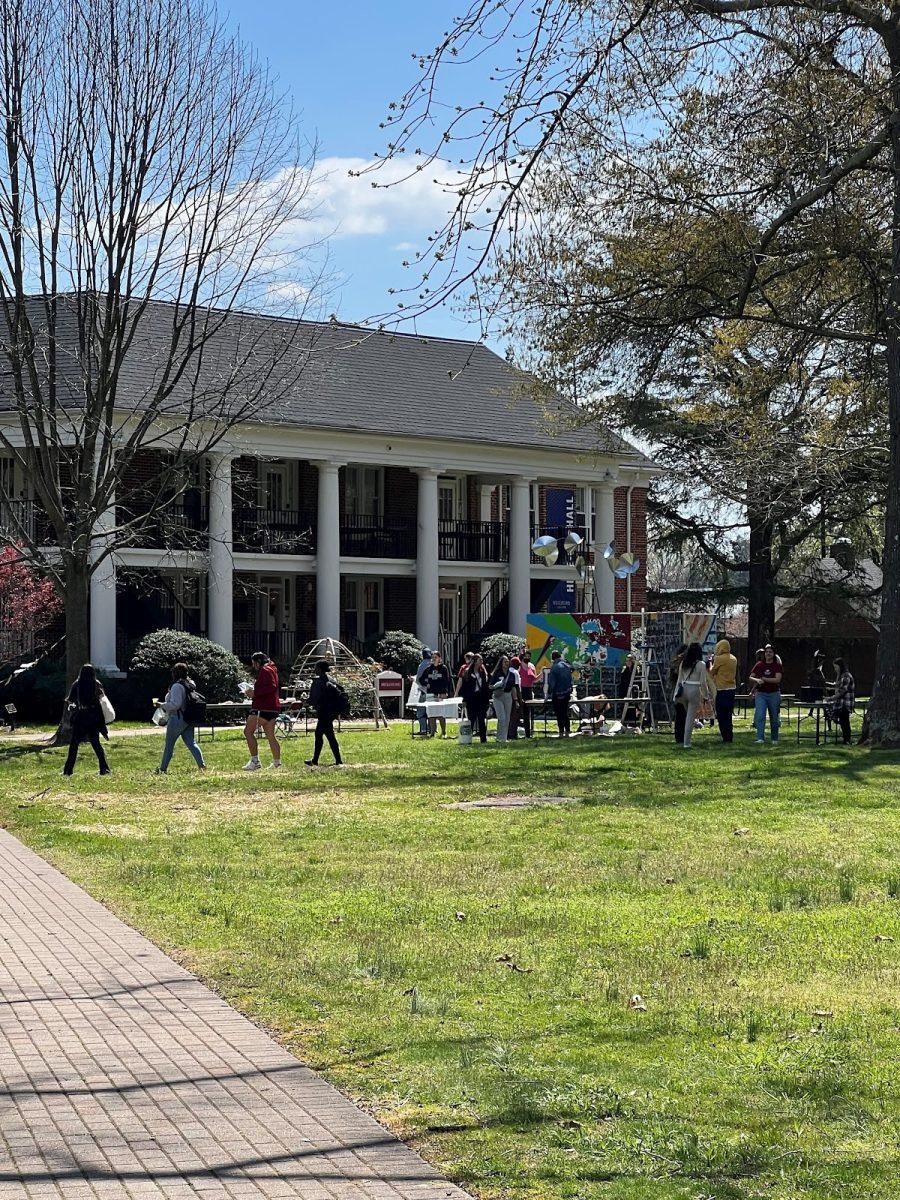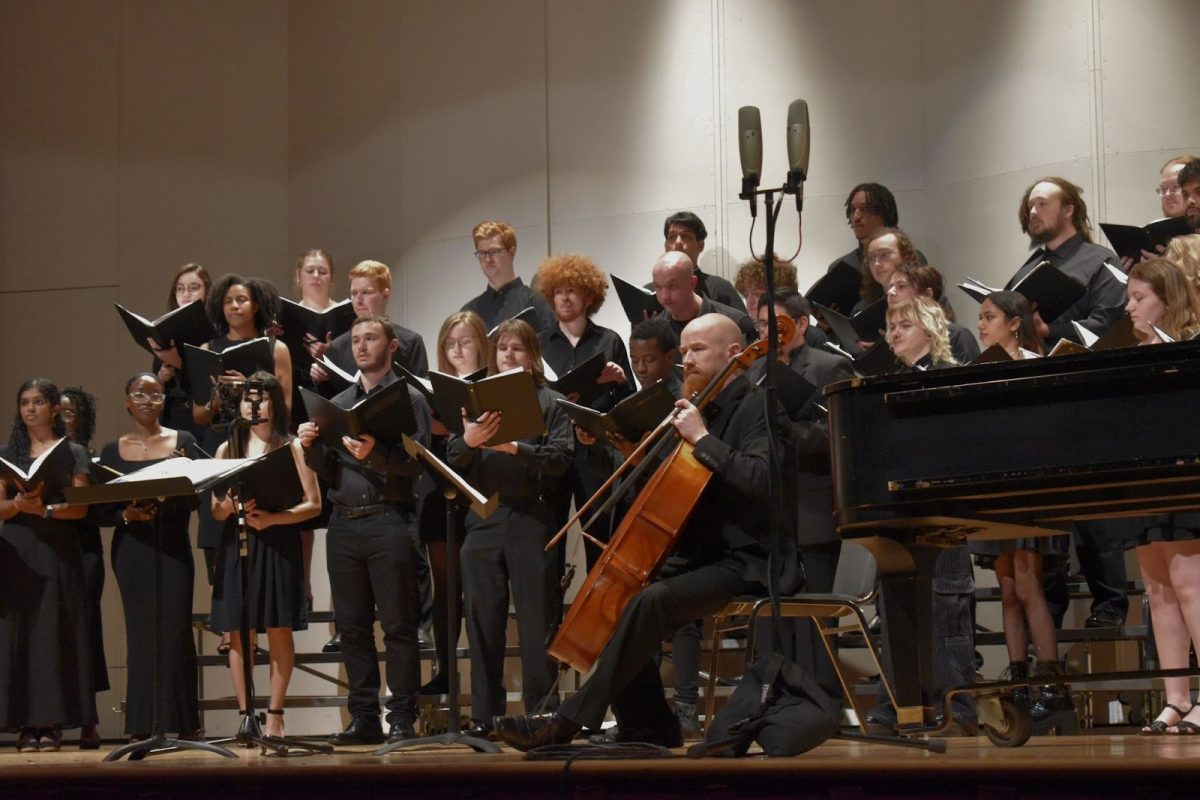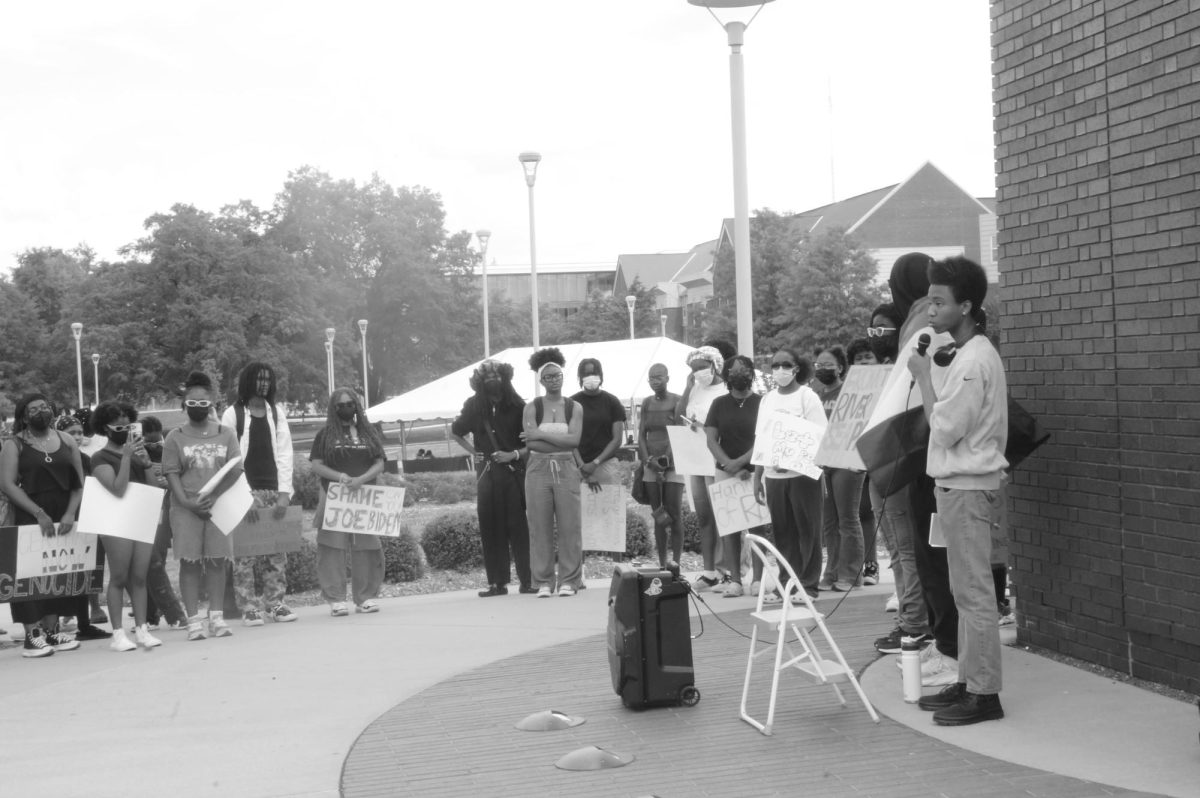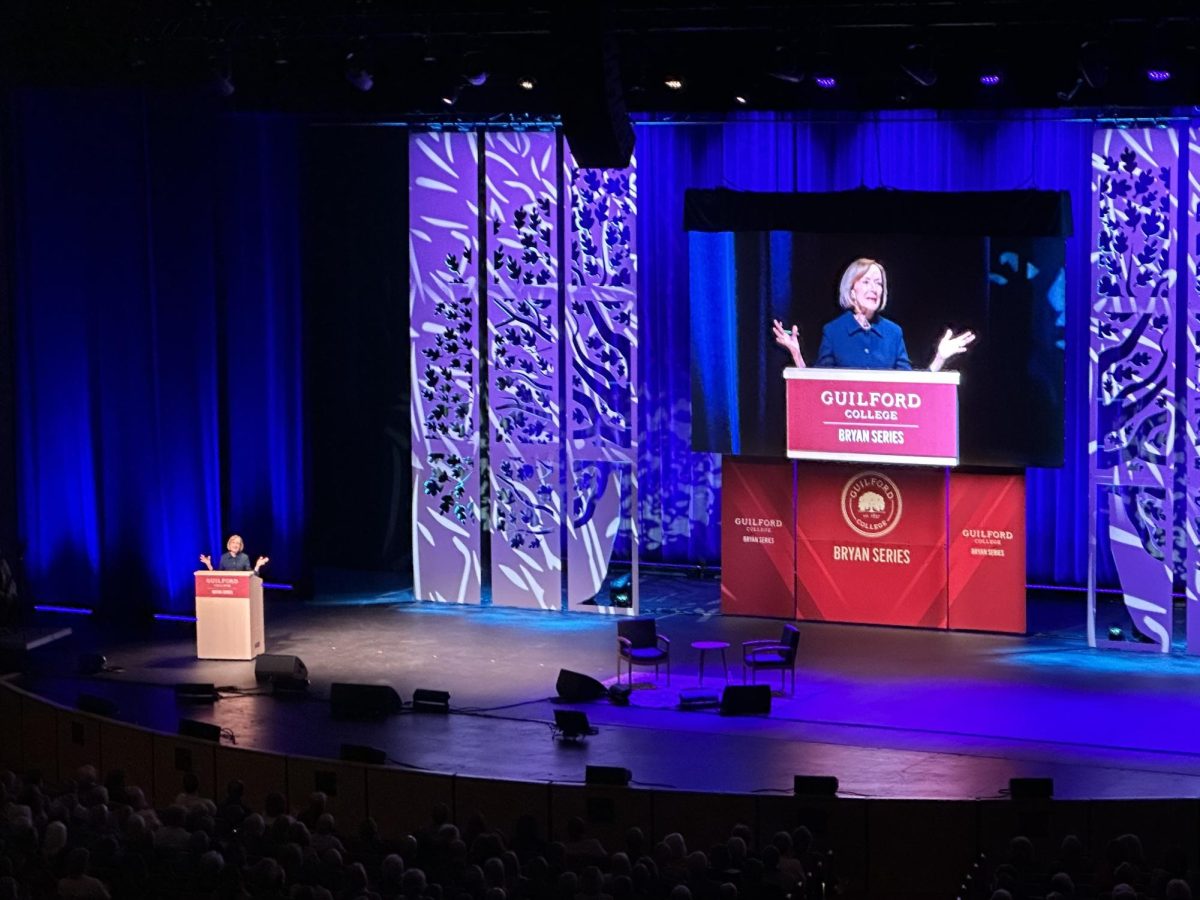Over the course of a summer, North Carolina went from shining example of the New South to laughingstock of the nation.
Spearheaded by the election of Governor Pat McCrory, Republicans consolidated control of the state government in 2012. They wasted little time consummating their neoconservative wet dreams by decreasing welfare benefits, demolishing conservation acts, denouncing Medicaid, degrading women’s reproductive rights, devaluing our education budget and — perhaps most damnable — denying voters’ rights to a tremendous number of North Carolinians, mainly minorities, the elderly and students.
Simultaneously, they cut taxes for corporations and the wealthy, granted raises to cabinet members and rewarded exorbitant salaries to campaign staffers in the style of classic cronyism.
Over the course of the summer, I fumed to myself, “Does no one witness the injustice committed in our state?”
Thankfully, I was not alone.
Beginning in Raleigh this spring, Moral Monday demonstrations sprouted across the state from Wilmington to Asheville, and coverage of the movement has appeared in the pages of national and international publications such as The New York Times, the Los Angeles Times and The Economist.
The movement resembles a counter–Tea Party, both in its opposition to Republican legislators and its motley crew of egalitarian activists.
“It’s a very eclectic group of people,” said Davia Young, first-year and Moral Monday protester. “It’s not just liberals or just certain types of people. It’s a huge mix because there are so many issues that have been brought up.”
Moral Mondays unite many people for various reasons, but all unite against the status quo in Raleigh.
“(Moral Monday protesters) won’t accept a government only for the white, only for the rich, only for the straight, only for the male, only for the Christian,” said Professor of Law Gene Nichol, Moral Monday protester and director of the Center on Poverty, Work and Opportunity at UNC-Chapel Hill, in an email to The Guilfordian. “But right now, that’s the government we have.”
Sadly — perhaps unsurprisingly — “the government we have” remains unmoved by the demonstrations.
“(Republican policymakers) didn’t care that so many of their constituents were upset at them,” said Tim Leisman ‘13, another Moral Monday protester. “They didn’t change their extremist agenda at all to reflect the opinion of the state.”
Governor McCrory exemplified GOP obstinacy when, instead of opening dialogue with activists, he hand-delivered a plate of cookies to women outside the governor’s mansion protesting the closure of abortion clinics — a condescending gesture reeking of the sentiment, “Let them eat cake.”
In revolutionary style, over 900 protesters have been arrested for refusal to disperse from the General Assembly. However, attendees consider detainment a badge of pride.
“One of the Moral Mondays was on my 18th birthday,” said Young. “The only present I asked for was permission from my parents to be arrested.”
Though overnight jailing principally symbolizes the commitment of Moral Monday protesters, the hopeful secondary effect seems obvious: spur North Carolinians’ attention in order to oust the GOP from the government in the next election.
The prospect seems feasible. Democratic candidates received 51 percent of votes in the last election and, according to a Sept. 12 release from Public Policy Polling, 54 percent of North Carolina voters strongly disapprove of complete Republican control of the state.
However, stealthy redistricting installed by the Republican-led 2010 Senate — gerrymandering former Democratic Governor Bev Perdue was unable to veto — secured the ace in the hole for Republicans in this past election. Along with voter suppression, district lines may prove what NC Policy Watch called “(the Republican) insurance policy.”
Whether or not the Moral Monday protests can overcome the strife imposed by reactionaries in the General Assembly has yet to be seen. The effect of the movement can only be realized next year, when voters take to the polls to decide whether or not they wish to be represented — or repressed.
[photomosaic nggid=152]













Bambiraptor • Oct 11, 2013 at 3:06 am
The majority of these comments are from the people who watch Fox News. Congratulations; you finally learnt how to use a computer to post insults to the author. I’m glad you have enough brain cells left.
However, please take your midget mentality to the nearest corner and sell it to someone who is willing to listen to your inflated gasbagging.
Georgio Poupopalamos • Oct 4, 2013 at 2:17 am
Why are half of these comments attacks against the author instead of critiquing the subject matter itself? I’m sure you all could muster up an informed sounding position and rebuttal since you are all so “superior” to the author.
Seriously, your ad hominem attacks are basically the same sentence repeated: “who must only be 12” “Anthony, I’m sure your sentiments are popular among most college age students” “Hopefully as Mr. Harrison gets out into the real world and grows up a bit he will come to realize how wrong he is.” “Someday, Anthony, you’ll be an adult and understand how wrong you are. Until then,enjoy the blissful ignorance of youth. “Oh Puleeze grow up you infantile children.” “I expect youthful ignorance from college students. We’ve all been there for at least a portion of our lives.”
Can’t you respond in a more mature way than attacking the author’s age and purported lack of real world experience? Can’t you sense the irony there?! I think we could all benefit from honest debate no matter what side you’re on w/o getting personal. I mean c’mon do any of you really know this guy? Or are you just guessing that b/c he’s in college he must be under 24 and living with his parents? Either way it doesn’t really make you look smart. SMH.
(I’m a Rep, tax payer, college graduate, employed full-time and in no way does my comment have anything to do with my political beliefs. So save your BS before you ignorantly start critiquing my political beliefs based on your assumptions about my experience, education or age.)
P.S. Lastly, what-the-friend is wrong with this guy? “his article is akin to wetting the bed — something that feels good at the time, but creates a bigger mess for the near future.” Did you seriously think this would be a comparison other ppl could relate to? You should prob keep things like that to yourself, freek :p.
Anthony Harrison • Oct 4, 2013 at 2:13 am
The other day, a friend of mine told me they really liked this article – my latest piece. I thanked them graciously, because I work hard to produce quality editorials, and it’s harder to produce quality editorials considering my other responsibilities, including my other responsibilities within The Guilfordian, my workload for other classes, and my job.
Yes, my job. More on that in a second.
After thanking my friend for complimenting this piece, they also let me know about the string of comments which sprouted in response to my piece. I was curious to read them, but I had to prepare a presentation on the life and times of Napoleon Bonaparte and also contribute line editing for this week’s coming issue.
I’ve read them now, after working seven hours and subsequently writing midterm evaluations for my staff.
I’d like to respond in kind.
EllieP: Thankfully, Caleb Brown has responded to your comments with very effective statistics. Who said that math can’t be awesome?
However, I will say your closing rhetoric makes you sound like one of those people who flies the Confederate Flag to demonstrate Southern Pride instead of vehement racism (which, by the way, you do if you endorse the Confederate Flag in any way, shape, or form). In response, I’ll say that we can really show ourselves to be “a shining example of a self-sufficient, strong, southern state” if we, say, don’t regress to being 1950’s Mississippi and allow people to vote. Oh, and if we give teachers the money they deserve, allow gay people to marry, allow women their right to abort a fetus without driving hundreds of miles, and help out people who struggle in today’s economy.
Jiminy Criminy: First off, your name is the funnest thing to say in the entire world.
Secondly, since you decided to go all ad hominem on me, allow me to retort: I’m a 25-year-old CCE student who’s working his ass off in more ways than one. We actually kid around in The Guilfordian about how I’m an “old man,” despite the fact that I am only 25.
But I’ll say this: I’ve been around. I’m not living in ignorant bliss anymore. I work extremely hard to achieve my goals. Sure, things will be different once I’m out and about and trying to found a career and make a name for myself – and it’s hard when you don’t have a name like Jiminy Criminy – but just because I have strong ideals different than yours doesn’t mean I’m living in “blissful ignorance.”
Harpo Marx: I love your work, especially in Monkey Business. A talent for the ages. Will you please tell me the tuning you came up with for the harp?
[BREAKING: Sources tell me Adolph “Harpo” Marx has been dead nearly 50 years. This man is an impostor.]
In all seriousness, I would totally give Republicans a chance, if they didn’t offend nearly every value I hold dear.
Thomas: I think you’re the first one who pretty much said, “GET A JOB YOU DAMN DIRTY HIPPIE.”
As I mentioned previously, I have a job (I told you this would come up!). I work at The Melting Pot in Greensboro. It’s not construction or nursing or sanitation, but it can still be pretty taxing work, especially considering the hours I keep for The Guilfordian.
Either way, I really enjoy it. I like earning my way. Hell, sometimes I can even save money. That’s really nice.
You know what’s also really nice? Realizing you aren’t the only human being in the country with needs, and realizing that paying taxes actually helps people, and realizing that you shouldn’t hoard money like some Randian leprechaun like you’re the only person in the world who matters.
So before you make snap judgments about how I’m riding on coattails and my parents’ metaphorical teat, consider the fact that a lot of us college students – “abusing” the system granted to us by our country so that we can learn to use our brains for the good of the future – are actually also workers in an economy which doesn’t give us many inroads.
Also, thank you for recognizing that I’d like to see positive change in the world. I really do. I just don’t think the draconian measures of Tea Party Republicans are the way to accomplish positive change. Thank you.
Geek[numbers]: “[T]eachers are simply [Democrats’] useful idiots.”
I’m glad you had a teacher who taught you how to effectively use “their” instead of “there” or “they’re.” Aren’t you?
Gina: Wow, you’re really racist! A big hand for Gina, ev’rybody!
Greg: If you’re asking me, no, I’m not twelve. I’m 25.
If you’re asking Gina, yes, I would believe that she is 12.
Hugh: Have you been sitting on that pun for a few months, or have you spouted it to all the members at the gun club and feel like it REALLY bit when you posted your comment?
Keith: I can understand budget cuts being enacted. It makes sense. Sometimes, you have to trim fat.
But the programs and ideas from which the General Assembly cut fat…that’s where I disagree. It doesn’t make sense to me. It impinges on what I believe to be inalienable rights.
Also, I’d like to extend an honest thank you for writing the most coherent rebuttal to my editorial.
Jeff: I’ve already addressed others regarding a) the undervalued position of teachers, and b) the fact that I’m not some 12-year-old trust fund baby, so instead of reiterating what I’ve already said, I’ll say what’s on my mind:
Go soak your head.
Jack: I appreciate your “involv[ment] in education.” Thank you for your service.
However, since you didn’t cite any sources to back up your claim, allow me to:
“At a total of $7,867,960,649, the 2014 fiscal year budget will spend $535 million less than the 2008 inflation-adjusted budget. And the 2014 budget fails to keep up with the needs of a growing student population. The Office of State Budget and Management estimates that $7,984,924,757 is actually needed to maintain current service levels of education.” (from NCPolicyWatch.com)
Keep in mind that this is for K-12 education. McCrory is virulently against the kind of education I receive: liberal arts.
Also keep in mind that McCrory went to Catawba College, a private liberal arts college, and majored in Education and Political Science. According to his own website, he initially used his talents for digging ditches for Duke Power.
Now, he’s digging moats for educators to cross by slashing their salaries while – as I mentioned – he gives exorbitant salaries to young insiders.
Good thing they didn’t use their degrees to start working at Duke Power, am I right??!?
I’m glad my little editorial for my little Opinion section in my little student-run newspaper at my little liberal arts college could inspire so much controversy.
Thank you,
Anthony Wayne Harrison, Jr.
Oh, and here’s this TLDR, for anyone who might happen to read this extreme wall of text:
http://25.media.tumblr.com/tumblr_mcwpgcXhE41rw0ifto1_500.gif
Jack Jasper • Sep 23, 2013 at 1:57 pm
As someone who is involved in education, now that the school year has started let me throw out one simple, indisputable fact: the state funding paid to school districts for this school year, per student, INCREASED over last year’s rate (which was an increase over the year before, and the year before that, etc.) So, the fact is, those “horrible” Republicans are spending more per student than the Democrats ever did.
Jeff DeWitt • Sep 23, 2013 at 1:32 pm
I see the Democrat indoctrination system (better known as the public schools) have done their job well.
Hopefully as Mr. Harrison gets out into the real world and grows up a bit he will come to realize how wrong he is.
Keith • Sep 23, 2013 at 12:29 pm
Anthony, I’m sure your sentiments are popular among most college age students. You mention a lot of what was done, but not why any of it was done. Either you’ve fallen prey to the narrative that Republicans are truly evil, or maybe that they somehow want to steal all of the money for their rich friends (look at Republican voter demographics–that claim doesn’t stand up). Allow me an analogy:
Dem’s put forth a bill named “Save the unicorns”. The Rep’s oppose it. The news says “Rep’s oppose saving the unicorns”. You like unicorns, so naturally you are with the Dem’s and against the Rep’s, right?
That’s where most people make up their mind and stop thinking. Especially young people.
So maybe it turns out that the bill doesn’t actually save any unicorns but instead costs taxpayers $30b and does nothing but pad the pockets of lawyers. Would you still support it? What if it saved…..1 unicorn? 2? How many to make it worth it?
Nearly every bill comes down to cost/benefit, with one side saying “it’s worth it”, and the other side saying “it’s not”. But that’s not how it’s portrayed in the news. That’s not interesting–it’s better to make people angry. So the news says that Republicans are evil unicorn killers. That’s what gets ratings (and makes people really commit to their political party).
So–please start asking WHY. You oppose what the Republicans are doing. Okay. So you know WHY the Republicans are doing it? If you do, then you can truly oppose it. If you don’t, then you’ve formed an opinion based on flawed information.
Caleb Brown • Sep 23, 2013 at 11:22 am
First, EllieP lets consider what the Moral Monday “tantrums” are about. They are about asserting a persons first amendment right to protest against any governmental body. Last time I checked, as an American I am encouraged to assert my rights. Protest is the American way and to dismiss an expression of anger practiced with a rich history and tradttion is an infantile fallacy that only wors to degrade your credibility. Secondly, keep in mind that just because a business sets up shop somewhere doesnt mean that the money it makes stays there. Take for example any walmart on the block. Almost every employee is kept at part time employment status (max 30 hr./ week) and paid minimum wage. So with an average of 470 employees per store thats an economic impact of about $105,800 per week. However every week an average of $203,150 is spent at each store. You can rest assured that this money is not retained in the community where the store is located but funneled back to the corporate headquarters which are not located in the United States period (see apple’s Irish shell company.) So for all of the wonder that bringing large corporations in at no tax cost, effectively cutting the amount of funding that the state can reinvest in its own citizens, we have a net loss of about $98,000. What a fantastic economic boost. So next time all of you want to make a statement about reality and how none of us college students have any idea about it, try analyzing the data surrounding you before making snap judgements based on emotion. Oh an you may ask where i learned all of these mathematical methods of analysis, only from the demonically liberal math teachers who do all they can to pervert the natural universe where they gather their data. And that as we all know is so easy to do.
References for statistics: http://www.statisticbrain.com/wal-mart-company-statistics/
Hugh • Sep 23, 2013 at 10:25 am
I expect youthful ignorance from college students. We’ve all been there for at least a portion of our lives.
Moral Mondays should be renamed Money Mondays. It’s the loss of funding to their causes that they grieve about.
“Morality” is just a convenient disguise. It makes them feel better about themselves.
Greg Dail • Sep 23, 2013 at 6:44 am
What are you, twelve?
Gina • Sep 23, 2013 at 5:17 am
Oh Puleeze grow up you infantile children. Your party is destroying this nation, just look at what you idiots elected to the presidency. A community organizer, a Lawyer that gave up his license rather than get disbarred, a man w/3 SS#’s, a fake BC, no college transcripts to see just how he became to be the smartest clown in the universe, a country that is crumbling because of him and Soros, his evil Jew master, a man who cannot tell the truth. Wars without Congressional approval, rumored to be a member of the Muslim Brotherhood, not a far fetch on that one. A man who spends our tax dollars to abort your children, black ones mostly. An economy that is showing no signs of recovery, more on welfare than ever, no jobs and now he thinks it’s a great idea to destroy the health care system. When you clowns stop electing people on feel good politics rather than what’s good for your country, maybe we can take you serious. Demand his records. Demand he reduce this debt he’s put on the heads of your children. Demand he exempt you from his failure called Affordable Health Care Act, LOL. Until then, shut the hell up.
geek49203 • Sep 22, 2013 at 6:18 pm
Yawn. Saw the same playbook in Wisconsin and Michigan. This is what Dems do when they lose power, and teachers are simply their useful idiots.
Stupid thing is that if the Dems woud’ve been in power, they woud’ve made much the same budget. Oh, some tweaks here and there, but the same “Cuts” would’ve been made. Cause, unlike DC, we can’t just print up money and borrow from the Chinese here.
So spare me your moral outrage — I had teachers who taught me history, and logic, and theology and stuff. This article is akin to wetting the bed — something that feels good at the time, but creates a bigger mess for the near future.
Thomas in Jacksonville • Sep 22, 2013 at 5:26 pm
This opinion piece by Anthony Harrison shows he knows nothing about the real world. While I applaud Anthony Harrison for his desire to see changes for the better in this world, he demonstrates his lack of knowledge in what happens outside the safety of his parents’ home or the close confines of college. In the real world adults are expected to work and earn their way in life. There is no such thing as a free home or a free lunch. Everything has to be paid for by someone no matter how small that thing is. Those “free” Obama phones are paid for by my tax money. That “free” healthcare is going to be paid for by me and those that work and pay taxes. All government education grants that Anthony Harrison and his friends use and abuse are paid for with my taxes. Note: I stated grants, not loans, but if they don’t pay the loans back tax payers will have to cover the cost. The Common Core program that the democrats are working for is an invasive program that places private information on all the family members into a federal data bank that is accessible by private elitist organizations. Why would any education program demand information on how the parents live or vote? As for food stamps, this program is being abused for millions of dollars. Who pays for this? The tax payer does. I could go on and on but the opinion piece show that Anthony Harrison needs to get out and work. He needs to EARN his way in life before he tries to spend my money on things he THINKS are nice.
Harpo Marx • Sep 22, 2013 at 12:55 pm
Well, opinions, like anal sphincter valves, everyone has one, they shouldn’t be seen in public, and are usually considered disgusting by those who have them on public display.
Why not give the Republicans a chance? When no competition exists you wind up with nothing to compare it to. I want to see North Carolinians going back to work. That benefits everyone. I want good schools just for the future of our country.
Jiminy Criminy • Sep 21, 2013 at 6:28 pm
Someday, Anthony, you’ll be an adult and understand how wrong you are.
Until then,enjoy the blissful ignorance of youth.
EllieP • Sep 21, 2013 at 2:01 pm
If anyone is laughing, they’re guffawing at the Moral Monday tantrums, SEIU-led astroturfing and intentional ‘arrests.’
Reality tells us NC is attracting new businesses from around the world. That just might be significant to the writer some day. NC is open for business again thanks to the undoing of decades of liberal ineptitude and corruption.
From strengthening a bankrupt and un-compliant HHS to proactively preventing another Gosnell to expanding educational choice for the neediest NC’ians to implementing the boldest tax reform package of any state in the union, McCrory & NCGA are well on their way to fixing what has been ailing NC. We are rising again as a shining example of a self-sufficient, strong, southern state. Would love to have you join in as part of the solution.